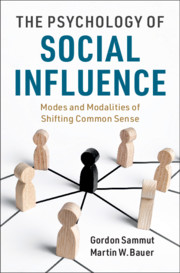Book contents
- The Psychology of Social Influence
- The Psychology of Social Influence
- Copyright page
- Dedication
- Contents
- Figures
- Tables
- Boxes
- Foreword 1
- Foreword 2
- Acknowledgements
- Chapter 1 Modalities of Social Influence
- Part I Recurrent Sources of Populism
- Part II Experimental Paradigms
- Part III Necessary Extensions
- Part IV Theoretical Integration
- Chapter 10 Common Sense
- Chapter 11 Epilogue
- References
- Index
Chapter 10 - Common Sense
Normalisation, Assimilation and Accommodation
from Part IV - Theoretical Integration
Published online by Cambridge University Press: 19 December 2020
- The Psychology of Social Influence
- The Psychology of Social Influence
- Copyright page
- Dedication
- Contents
- Figures
- Tables
- Boxes
- Foreword 1
- Foreword 2
- Acknowledgements
- Chapter 1 Modalities of Social Influence
- Part I Recurrent Sources of Populism
- Part II Experimental Paradigms
- Part III Necessary Extensions
- Part IV Theoretical Integration
- Chapter 10 Common Sense
- Chapter 11 Epilogue
- References
- Index
Summary
Chapter 10 offers a theoretical integration of the various social influence modalities discussed in previous chapters. It starts by examining the historical evolution of common sense in processes of intersubjectivity and inter-objectivity; social influences are the mechanisms that regulate the normalisation, assimilation and accommodation of new ideas and practices. The chapter elaboratesthe cyclone model of social influence that integrates these three mechanisms in a dynamic and underdetermined process of social change. The chapter summarises the key tenets of the various modalities of social influence in a Periodic Table of Social Influence. The Periodic Table identifies modalities and their properties in the modes of intersubjective and inter-objective interaction, namely face-to-face, mass mediation and designed artefacts. This Periodic Table of Social Influence will support and catalyse further empirical scholarship and investigations concerning social influence that remain highly pertinent in current society.
Keywords
- Type
- Chapter
- Information
- The Psychology of Social InfluenceModes and Modalities of Shifting Common Sense, pp. 217 - 242Publisher: Cambridge University PressPrint publication year: 2021

